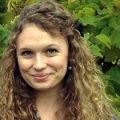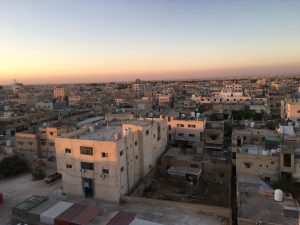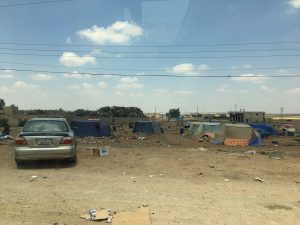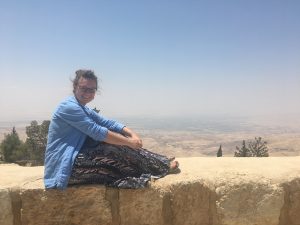
She spent five weeks volunteering with a Church in Jordan working with refugees in June and July 2019.
Home is precious
After spending five weeks alongside refugees in Jordan, I am back home and back to work.
Both words – home and work – have gained a different meaning during this time.
Home is even more precious than before, and working at my desk and ploughing through hundreds of emails that had accumulated over the past weeks is almost unreal.
Many people have asked how my trip was and after answering for the tenth time ‘good, but challenging‘, some of the emotions I’ve tried to hold back over the last days catch up with me.
My eyes well up, but I’m not sure if another person would quite understand what I was feeling. Feelings of pain produced by stories and experiences that aren’t even my own.
Crossroads
Together with my husband I spent a brief five weeks in Mafraq, a town in the North of Jordan, just a few miles South of the Syrian border.
Every day we spent many hours with Syrian families who had crossed that border on foot and can still see their home country on a clear day.

Mafraq means crossroads, and over the last 8 years it has truly become just that.
With a population of only 200,000, Mafraq hosts 100,000 refugees.
Every second person in Mafraq is forcibly displaced. Just a few miles further, in the middle of the desert is one of the largest refugee camps for Syrian refugees in the world, Zataari.
In total, Jordan is home to 662,010 registered Syrian refugees.
Some evenings it felt easier trying to numb myself to what I had seen that day, but fighter jets flying low over the roofs of the town quickly pulled me back into the reality of living close to a conflict zone.
I remember clearly the first family we visited.
It was Ramadan, the heat was scorching and dry. We entered a very rough looking home; bare cement walls were painted yellow to cover up some of the brokenness.
Hanna was the mother’s name.
Up to this day she has been hoping and praying that her husband would return to her after he had been abducted in Syria 8 years ago.
She doesn’t know whether he is dead or alive. Hanna was 10 when she first met her husband.
Keifik? How are you?
After some conversation a very shy boy peeped around the corner and was then clumsily shuffling across the room, holding on to the wall so he wouldn’t fall over.
Most of his life he hadn’t been able to walk until he’d finally been able to have an operation not long ago.
Never did we ask the question of ‘why’ unless the information was volunteered to us.
Almost one third of Syrian households have at least one family member with a disability.

It took another while until the boy slowly approached me and sat next to me on the floor.
While the others were engaged in conversation, he was looking at his legs, and with an ever widening grin he turned to me and whispered ‘keifik?’ (‚how are you?’).
I had hardly ever seen such a smile that combined cheekiness, shyness, happiness and somehow brokenness in one. I learnt his name was Ahmed and he was 10 years old.
He’d never been to school, but going to school was all he could think about, especially now that he could move more independently!
After several hours of listening and talking, sitting cross-legged on the thin mattresses the family used as their beds at night, our first visit came to an end.
Stories of pain and resilience
What followed were days filled with long visits, when unspeakable stories were told, stories of grief and pain, of being exploited, neglected, disappointed, abused, tormented and tortured.
Stories of hard work, anxiety, accidents, loneliness, anger, and sleeplessness.
Stories of disabilities, poverty, desperation and hopelessness.
Stories that were told with words, and stories that were shared with tears.
Stories that showed me that God has created us with resilience, and how desperately we need to pray for deliverance and peace.
Suffering doesn’t end by crossing a border.
And as clearly as I remember difficult visits I also remember visits that were filled with laughter, games and balloon animals.
Visits filled with encouragement, stories about God and his faithfulness, and the endless generosity of people who shared the very little they had.
In my third week in Jordan I was asked to support art therapy classes for Syrian kids at a local school. I was to lead a group of 23 Syrian boys.
The thought overwhelmed me a bit, as I am not an artist, nor a therapist, nor do I know how to handle a class of boys, but I gave it a try.
I was running late, so I jumped in the front seat of a packed van which would take me and others to the school.
Shutting the door behind me I noticed that another person was squished into the same seat as me.
With the biggest smile I had ever seen, Ahmed looked up at me. ‘Keifik?’ he asked.
Glimpses of hope
Ahmed had been up since 5am, ready and dressed, waiting to be picked up for his very first day of school!
It was the first day he would play with others on the playground and sit in a class room trying not to be distracted by the mischief of other children.
Even now his jubilant face radiates at me as I think of Ahmed in my prayers.
It was such a great day.

Suffering doesn’t end when you cross a border, indeed in some cases it seems never-ending.
But there are glimpses of hope and joy like the excitement I was able to share with Ahmed.
Can you imagine that he was only one and a half years old when the war started? Let’s not wait until we hear fighter jets flying over our roofs (or read more tragic stories in the news) before we are pulled back into the reality of millions of people suffering around the world that we are called to pray for and support.
Sabine was able to take part in this trip with the support of The Society in Scotland for Propagating Christian Knowledge.
